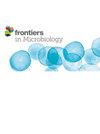Antibiotic-induced dysbiosis in the SCIME™ recapitulates microbial community diversity and metabolites modulation of in vivo disease
IF 4
2区 生物学
Q2 MICROBIOLOGY
引用次数: 0
Abstract
Establishing the contextIntestinal dysbiosis is a significant concern among dog owners, and the gut health of pets is an emerging research field. In this context, the Simulator of the Canine Intestinal Microbial Ecosystem (SCIME™) was recently developed and validated withSCIME™ 中抗生素诱导的菌群失调再现了微生物群落多样性和代谢物对体内疾病的调节作用
研究背景肠道菌群失调是狗主人非常关心的问题,宠物肠道健康是一个新兴的研究领域。在此背景下,最近开发了犬肠道微生物生态系统模拟器(SCIME™),并用体内数据进行了验证。说明目的/介绍研究目前的研究进一步应用了这一模型,使用阿莫西林和克拉维酸诱导菌群失调,目的是引起微生物群落和代谢产物产生的变化,这些都是众所周知的体内疾病标志物。结果表明,在 SCIME™ 模型中,抗生素刺激可使微生物群落和代谢活动发生显著变化,包括微生物丰富度下降、丙酸产量减少和微生物组成改变。此外,还观察到测试日粮诱导的铵和丁酸水平的变化。讨论结果这种微生物群落和代谢产物产生的变化模拟了犬体内菌群失调的模式。我们建立了一个模拟犬抗生素诱导的菌群失调的新型动态体外模型,该模型能够再现在体内观察到的微生物和代谢变化,适用于测试营养变化的影响。
本文章由计算机程序翻译,如有差异,请以英文原文为准。
求助全文
约1分钟内获得全文
求助全文
来源期刊

Frontiers in Microbiology
MICROBIOLOGY-
CiteScore
7.70
自引率
9.60%
发文量
4837
审稿时长
14 weeks
期刊介绍:
Frontiers in Microbiology is a leading journal in its field, publishing rigorously peer-reviewed research across the entire spectrum of microbiology. Field Chief Editor Martin G. Klotz at Washington State University is supported by an outstanding Editorial Board of international researchers. This multidisciplinary open-access journal is at the forefront of disseminating and communicating scientific knowledge and impactful discoveries to researchers, academics, clinicians and the public worldwide.
文献相关原料
| 公司名称 | 产品信息 | 采购帮参考价格 |
|---|
 求助内容:
求助内容: 应助结果提醒方式:
应助结果提醒方式:


